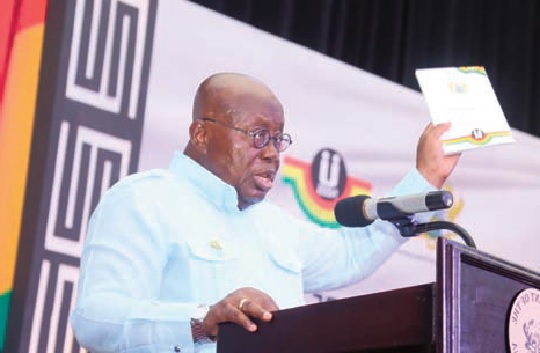President Akufo-Addo
President Akufo-Addo yesterday outdoored a new National Service Policy to change the face of the Service.
The 10-year policy, spanning the period 2024 to 2034, is intended to channel the energies of service personnel towards national development goals.
It aims to provide a structured framework for directing resources and efforts towards maximizing state interests and aligning with aspirations of service personnel.
Speaking at the launch in Accra yesterday, President Akufo-Addo said the strategic objectives of the new policy represent a paradigm shift that aligns with the government’s agenda to ensure that service personnel are adequately prepared to transition from school into the work place.
“The policy will enhance capacity, reinforce structures and enable the national service scheme to mobilize, effectively, the clearer increasing number of graduates to areas of national priority,” he said.
The core focus areas of the policy include the deployment of personnel to national priority sectors crucial for socioeconomic development; the inculcation of national values in service personnel; and the establishment of effective mechanism to measure achievements among others.
Apart from that, he said, “this policy marks a significant milestone in our efforts to harness the potential of our youth towards nation-building.”
By instilling national values and directing their efforts towards priority areas, President Akufo-Addo said the policy will help cultivate a sense of civic duty and drive sustainable development across the nation.
It is for this reason, he said, the government stands ready to play its part in ensuring an effective implementation of the policy.
“I want to assure you that the government is fully committed to providing the enabling environment, resources and the logistical support to ensure the successful implementation of the policy,” he assured.
The 10-year duration of the policy, the President said reflects a long-term vision, ensuring continuity and consistency in the deployment of resources and personnel and is poised to address key challenges and capitalize on emerging opportunities in various sectors critical to the country’s growth trajectory.
This, he said, is part of reasons the government has over the past seven years committed to the development of the human capital of the country through programmes such as the Free Senior High School (SHS) policy, and free TVET programmes among other interventions.
“The free SHS programme has increased significantly the number of institutional graduates with some 150,000 young Ghanaians graduating annually, as this number continues to rise, it is imperative that the national service scheme, the institution responsible for transforming this critical mass, is strengthened.”
The youth of Ghana, like any of their compatriots around the world, he said, constitute a significant portion of the population who need to be empowered to spur national development.
President Akufo-Addo said, the broad consultative nature of the policy was to ensure that it reflects realities and enhance the image of the country internationally and stand the test of time.
He, thus, urged all stakeholders to maintain the spirit of collaboration during the implementation process.
“I encourage the management of the National Service Scheme (NSS) to leverage strong partnerships with domestic and international stakeholders to ensure the policy is successful,” he emphasised.
He also stressed the government’s commitment to make available adequate annual budgetary resources for the successful implementation of the policy.
On his part, Executive Director of the National Service Scheme, Osei Assibey Antwi said the new policy provides concise and precise roles required of all stakeholders based on consensus.
He noted that the policy will be followed by a comprehensive implementation plan.
“To ensure policy coherence, value for money and the determination of success, the policy will be subjected to diligent review. All programmes, projects and activities of the scheme will be aligned to the various policy strategies, monitored and evaluated on a regular basis,” he explained.
Beyond the policy, he said the Scheme needs to be strengthened, and significantly resourced to regulate mobilization and deployment of personnel.
By Charles Takyi-Boadu, Presidential Correspondent

